Skimming through heaps of CVs and resumes, losing countless hours looking for specific keywords, overlooking deserving candidates simply because their qualifications weren’t phrased in a particular way. This is the case with traditional recruitment processes— repetitive, time-consuming, and prone to error. Considering the sheer number of applications, it can be challenging for recruiting experts and HR departments to stay organized. And if that isn’t enough, add the desperate need to fill the position fast, and the process of manually sifting through CVs becomes a choke point rather than a starting point. This is where AI-powered resume screening shines, as it helps to improve the process and efficiency by shifting the focus to fit rather than formatting.
According to Insight Global’s 2025 AI in Hiring report, 99% of hiring managers use AI at some point during the hiring process, underscoring the widespread adoption of this technology. With this change comes increased adoption of smart & scalable technologies that are often leveraged through specialized AI development companies. These firms provide tailored machine learning (ML) and automation solutions to help enterprises create customized automated hiring software solutions.
If you’re wondering where to begin AI-powered resume screening for high-volume roles, let’s understand the meaning of AI in resume screening, how it works, how traditional methods are holding your business down, and how AI in resume screening emerges as a revolutionary solution.
Understanding AI in Resume Screening: Work Process, Benefits & Applications
AI in resume screening involves utilizing new technologies, such as Artificial Intelligence (AI), to review and manage applications and resumes. This modern screening method is designed to help hiring teams identify the right candidates with greater accuracy and intuition. Organizations looking to streamline their hiring processes can benefit from reduced biases, operational cost savings, and time savings.
Sifting through countless piles of resumes can certainly be overwhelming, as it requires manually sorting through CVs, aligning key qualifications required, and identifying experiences that match the job. AI in resume screening tools cuts the problem in half by scoring applicants based on their experience, credentials, skills, and specialities. Advanced algorithms are capable of scanning the content inside a resume more thoroughly than detailed paragraphs, which means a sophisticated program can identify the best candidates for the job.
Difference Between Traditional Resume Screening vs. AI in Resume Screening
Many businesses still employ conventional hiring techniques, but they often fall short in areas such as agility, volume, and consistency. That’s where AI in resume screening takes the lead. With the help of artificial intelligence, companies can automate the process of resume screening, resulting in reduced friction within the system and faster hiring and better decision-making.
Traditional Resume Screening vs. AI in Resume Screening
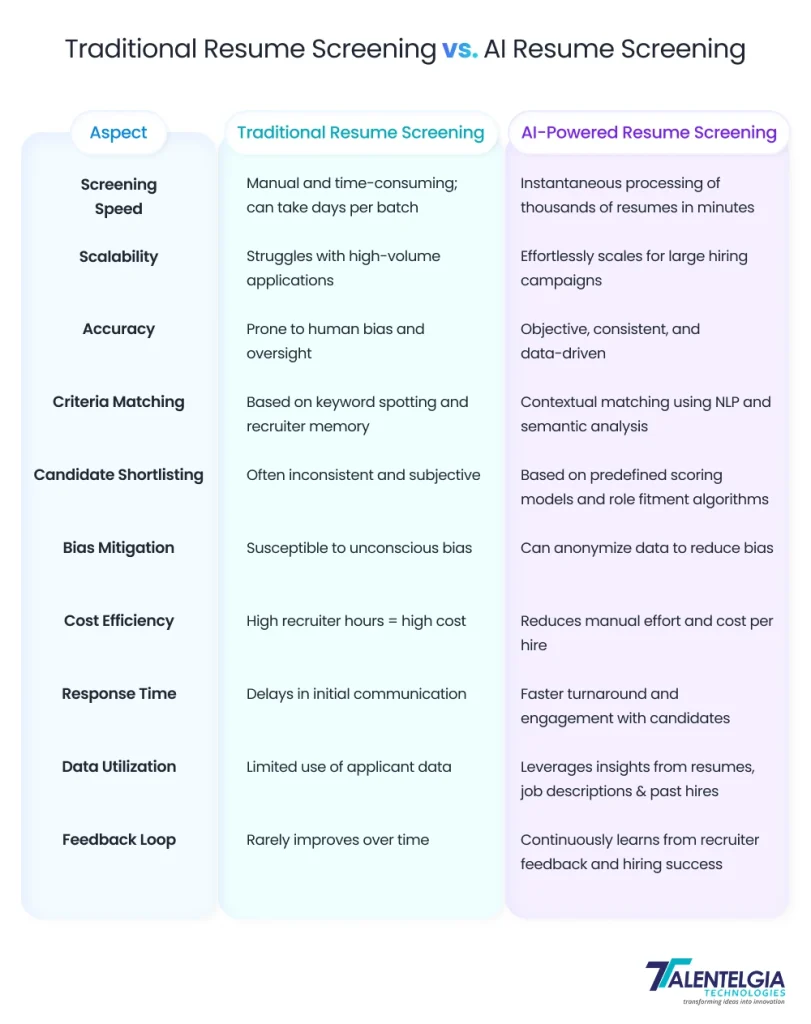
What Is The Work Process of AI in resume screening?
The latest Artificial Intelligence technologies enable resume screening through machine learning (ML) and natural language processing (NLP). Unlike traditional methods that rely solely on keywords, these modern technologies help evaluate a candidate’s work experience and skills for the job. With a better contextual understanding, the candidate is assessed for a more accurate fit, thereby improving the quality of the hire.
For every applicant who uploads a resume, the modern screening tools not only read the content in the resume but also score and rank all applicants in a multi-step process. Understanding the stages of AI in resume screening helps make better use of the technology, thereby streamlining the hiring process.
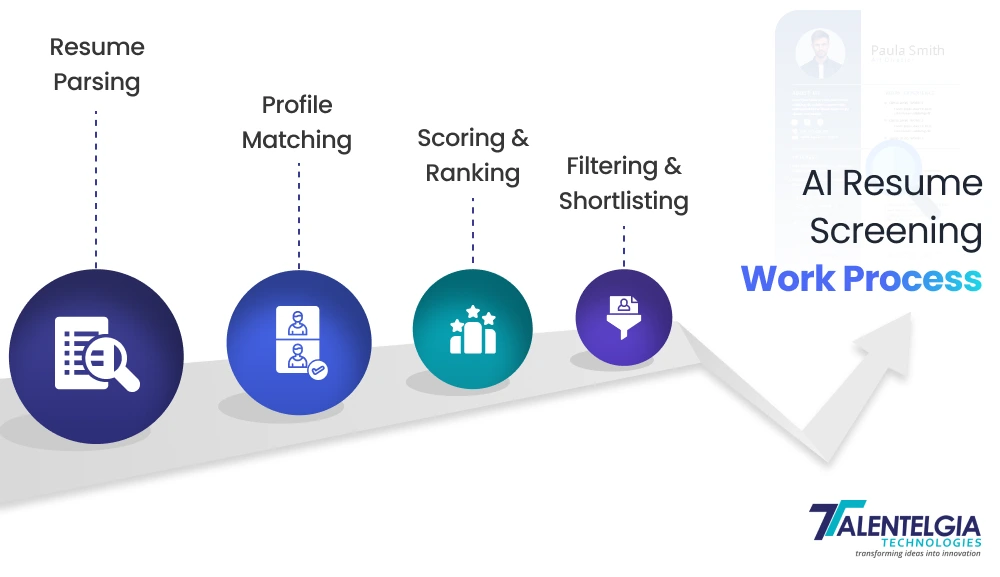
This is how AI in resume screening usually works:
- Resume Parsing: Scans resumes and extracts relevant information, including work experience, education details, skills, and certifications. This enables the system to analyze and compare resumes by transforming unstructured text into structured data.
- Profile Matching: A candidate’s information is compared with the job description and an ideal candidate profile. The tool retrieves relevant skills, experiences, and contextually relevant keywords, extending beyond exact matches.
- Scoring & Ranking: Candidates are scored against the job requirements, which the AI evaluates based on the position’s specifications. This scoring system enables recruiters to quickly identify the most suitable candidates without having to sift through resumes manually.
- Filtering & Shortlisting: Candidates with an insufficient score or lacking key requirements, such as a suitable location, relevant certifications, or essential skills, are filtered out. Shortlisted candidates are ranked, and a subset with the highest scores is suggested to the recruiter for review.
Top 5 Benefits of AI In Resume Screening and Recruitment
HR teams are utilizing innovative tools to support the evolving hiring process. AI technologies, such as AI in resume screening and recruitment, enable HR personnel to streamline their recruiting practices, making them more precise and efficient. Key benefits include:
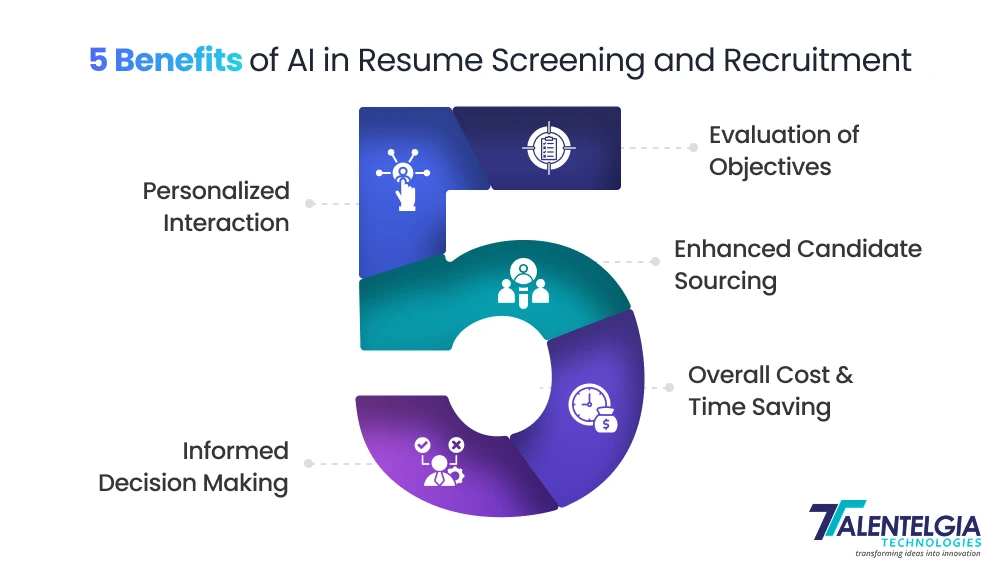
- Evaluation of Objectives
When designed correctly, AI systems can evaluate job applicants based on their skills, experience, and other relevant factors. Using artificial intelligence for this purpose minimizes the chances of human error, offering a fairer and more accountable progression in hiring.
For example, AI agents can perform structured interviews, where each candidate responds to the same set of questions for uniform assessment.
- Enhanced Candidate Sourcing
AI can scan external databases, social media, and other professional networking sites to find prospective candidates. This capability expands the available talent pool and increases the probability of finding the right fit for a position. In addition, these AI Assistants can perform monitoring tasks, notifying recruiters of new potential candidates as they appear.
- Overall Cost & Time Saving
AI has streamlined the recruitment process by automating administrative tasks, including resume screening and interview scheduling. This increase in efficiency helps alleviate costs associated with prolonged vacancies or the need for additional hiring resources. These advantages, when accumulated over time, can significantly improve organizational effectiveness.
- Informed Decision-Making
AI can generate actionable insights for recruitment by processing vast amounts of data. For instance, AI can determine which sourcing methods yield the most qualified candidates, analyse which job descriptions attract the most applicant submissions, and even forecast candidates’ performance using past trends. Such information can significantly aid in strategic planning and drive continuous improvement initiatives.
- Personalized Interactions
AI-powered chatbots can modify their conversations with applicants based on prior interactions and behavioural patterns, enhancing applicant engagement. This not only improves overall satisfaction but also helps enhance the employer brand. Additionally, AI can utilise this information to create detailed candidate profiles, enabling recruiters to engage more effectively and efficiently.
3 Real-World Applications of AI in Resume Screening and Recruitment in Bulk
Until now, businesses have been automating their bulk hiring processes, which isn’t a new development. However, what’s new is the recruitment team’s use of artificial intelligence to take things to the next level. With the help of AI tools, the high-volume recruitment process can now be streamlined, top talent can be discovered, and candidate engagement has reached new heights, with interactions now faster and more efficient.
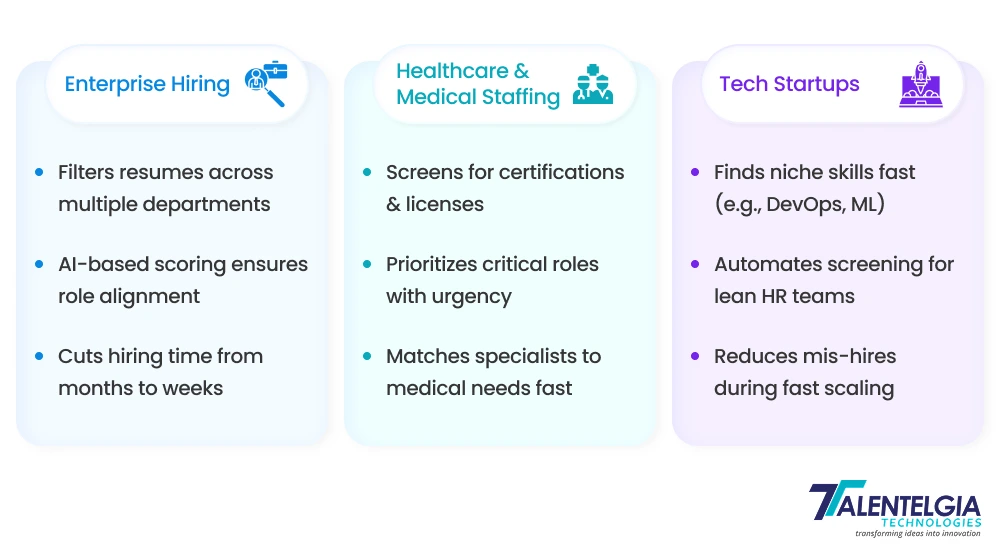
But how exactly is AI used in the real-world recruitment process in bulk? Let’s discover some of the most common applications of AI in resume screening and how it is changing the paradigm of our workflows:
- Enterprise Hiring
Large corporations like Unilever, PepsiCo, and Deloitte hire for thousands of roles across different departments, regions, and time zones. There is no option for manual testing.
How AI helps:
- AI tools automatically parse and rank resumes based on job criteria.
- Role-fit scoring eliminates weak matches early on, allowing for more effective matching.
- Interview scheduling is automated for qualified leads.
- Healthcare & Medical Staffing
Hospitals, clinics, and health tech firms need to fill roles urgently, often with very specific licensing and credential requirements. AI makes it easier to navigate complex qualifications.
How AI helps:
- Filters candidates by certifications, specialities, and location-specific licenses
- Prioritizes urgency and availability in fast-paced environments
- Screens for soft skills using NLP-based sentiment analysis (for patient-facing roles)
- Tech Startups
Startups need to scale fast, and that means hiring developers, marketers, product managers, and designers quickly. Traditional screening can’t keep up with this speed.
How AI helps:
- Uses semantic search to find niche skillsets (e.g., Python + Django + DevOps)
- Integrates with GitHub/LinkedIn profiles to build candidate context
- Helps non-HR founders hire smart without hiring a whole recruiting team
The Bottom Line
Reviewing and processing large volumes of resumes does not need to be a cumbersome task. Using Recruitease Pro along with systematic set requirements and intelligent automation streamlines the process of screening hundreds or thousands of resumes with precision. This helps build dependable pipelines, minimize hiring risk, and reclaim time for more critical and strategic interviews.
Do you want Recruitease Pro to handle all your screening and recruitment needs? Book a demo with us.


 Healthcare App Development Services
Healthcare App Development Services
 Real Estate Web Development Services
Real Estate Web Development Services
 E-Commerce App Development Services
E-Commerce App Development Services E-Commerce Web Development Services
E-Commerce Web Development Services Blockchain E-commerce Development Company
Blockchain E-commerce Development Company
 Fintech App Development Services
Fintech App Development Services Fintech Web Development
Fintech Web Development Blockchain Fintech Development Company
Blockchain Fintech Development Company
 E-Learning App Development Services
E-Learning App Development Services
 Restaurant App Development Company
Restaurant App Development Company
 Mobile Game Development Company
Mobile Game Development Company
 Travel App Development Company
Travel App Development Company
 Automotive Web Design
Automotive Web Design
 AI Traffic Management System
AI Traffic Management System
 AI Inventory Management Software
AI Inventory Management Software
 AI Software Development
AI Software Development  AI Development Company
AI Development Company  AI App Development Services
AI App Development Services  ChatGPT integration services
ChatGPT integration services  AI Integration Services
AI Integration Services  Generative AI Development Services
Generative AI Development Services  Natural Language Processing Company
Natural Language Processing Company Machine Learning Development
Machine Learning Development  Machine learning consulting services
Machine learning consulting services  Blockchain Development
Blockchain Development  Blockchain Software Development
Blockchain Software Development  Smart Contract Development Company
Smart Contract Development Company  NFT Marketplace Development Services
NFT Marketplace Development Services  Asset Tokenization Company
Asset Tokenization Company DeFi Wallet Development Company
DeFi Wallet Development Company Mobile App Development
Mobile App Development  IOS App Development
IOS App Development  Android App Development
Android App Development  Cross-Platform App Development
Cross-Platform App Development  Augmented Reality (AR) App Development
Augmented Reality (AR) App Development  Virtual Reality (VR) App Development
Virtual Reality (VR) App Development  Web App Development
Web App Development  SaaS App Development
SaaS App Development Flutter
Flutter  React Native
React Native  Swift (IOS)
Swift (IOS)  Kotlin (Android)
Kotlin (Android)  Mean Stack Development
Mean Stack Development  AngularJS Development
AngularJS Development  MongoDB Development
MongoDB Development  Nodejs Development
Nodejs Development  Database Development
Database Development Ruby on Rails Development
Ruby on Rails Development Expressjs Development
Expressjs Development  Full Stack Development
Full Stack Development  Web Development Services
Web Development Services  Laravel Development
Laravel Development  LAMP Development
LAMP Development  Custom PHP Development
Custom PHP Development  .Net Development
.Net Development  User Experience Design Services
User Experience Design Services  User Interface Design Services
User Interface Design Services  Automated Testing
Automated Testing  Manual Testing
Manual Testing  Digital Marketing Services
Digital Marketing Services 
 Ride-Sharing And Taxi Services
Ride-Sharing And Taxi Services Food Delivery Services
Food Delivery Services Grocery Delivery Services
Grocery Delivery Services Transportation And Logistics
Transportation And Logistics Car Wash App
Car Wash App Home Services App
Home Services App ERP Development Services
ERP Development Services CMS Development Services
CMS Development Services LMS Development
LMS Development CRM Development
CRM Development DevOps Development Services
DevOps Development Services AI Business Solutions
AI Business Solutions AI Cloud Solutions
AI Cloud Solutions AI Chatbot Development
AI Chatbot Development API Development
API Development Blockchain Product Development
Blockchain Product Development Cryptocurrency Wallet Development
Cryptocurrency Wallet Development About Talentelgia
About Talentelgia  Our Team
Our Team  Our Culture
Our Culture 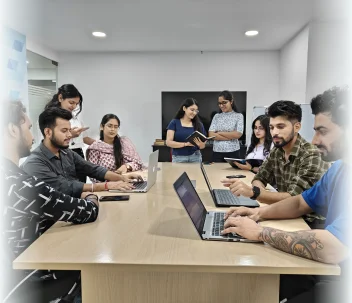
 Healthcare App Development Services
Healthcare App Development Services Real Estate Web Development Services
Real Estate Web Development Services E-Commerce App Development Services
E-Commerce App Development Services E-Commerce Web Development Services
E-Commerce Web Development Services Blockchain E-commerce
Development Company
Blockchain E-commerce
Development Company Fintech App Development Services
Fintech App Development Services Finance Web Development
Finance Web Development Blockchain Fintech
Development Company
Blockchain Fintech
Development Company E-Learning App Development Services
E-Learning App Development Services Restaurant App Development Company
Restaurant App Development Company Mobile Game Development Company
Mobile Game Development Company Travel App Development Company
Travel App Development Company Automotive Web Design
Automotive Web Design AI Traffic Management System
AI Traffic Management System AI Inventory Management Software
AI Inventory Management Software AI Software Development
AI Software Development AI Development Company
AI Development Company ChatGPT integration services
ChatGPT integration services AI Integration Services
AI Integration Services Machine Learning Development
Machine Learning Development Machine learning consulting services
Machine learning consulting services Blockchain Development
Blockchain Development Blockchain Software Development
Blockchain Software Development Smart contract development company
Smart contract development company NFT marketplace development services
NFT marketplace development services IOS App Development
IOS App Development Android App Development
Android App Development Cross-Platform App Development
Cross-Platform App Development Augmented Reality (AR) App
Development
Augmented Reality (AR) App
Development Virtual Reality (VR) App Development
Virtual Reality (VR) App Development Web App Development
Web App Development Flutter
Flutter React
Native
React
Native Swift
(IOS)
Swift
(IOS) Kotlin (Android)
Kotlin (Android) MEAN Stack Development
MEAN Stack Development AngularJS Development
AngularJS Development MongoDB Development
MongoDB Development Nodejs Development
Nodejs Development Database development services
Database development services Ruby on Rails Development services
Ruby on Rails Development services Expressjs Development
Expressjs Development Full Stack Development
Full Stack Development Web Development Services
Web Development Services Laravel Development
Laravel Development LAMP
Development
LAMP
Development Custom PHP Development
Custom PHP Development User Experience Design Services
User Experience Design Services User Interface Design Services
User Interface Design Services Automated Testing
Automated Testing Manual
Testing
Manual
Testing About Talentelgia
About Talentelgia Our Team
Our Team Our Culture
Our Culture
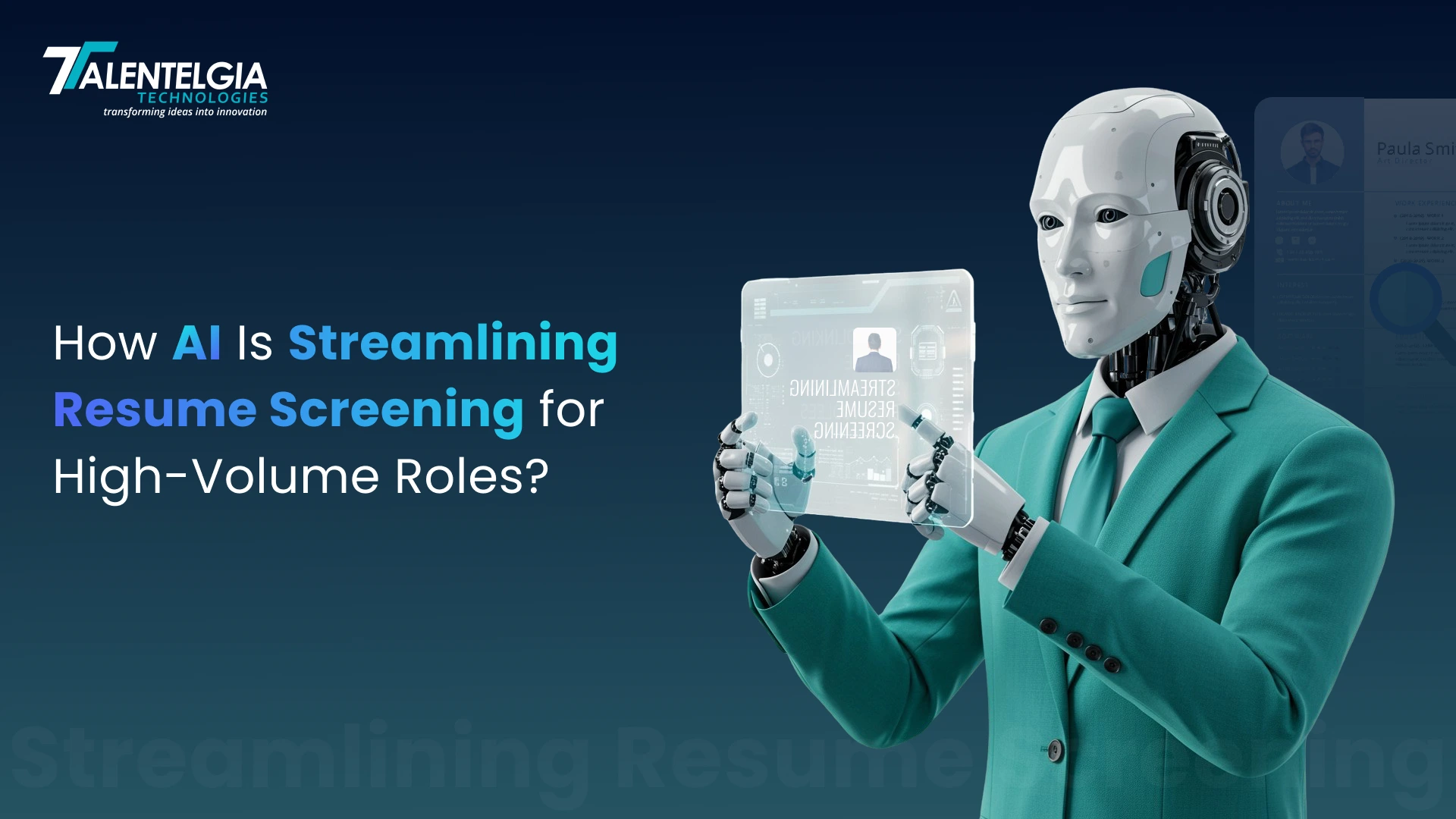
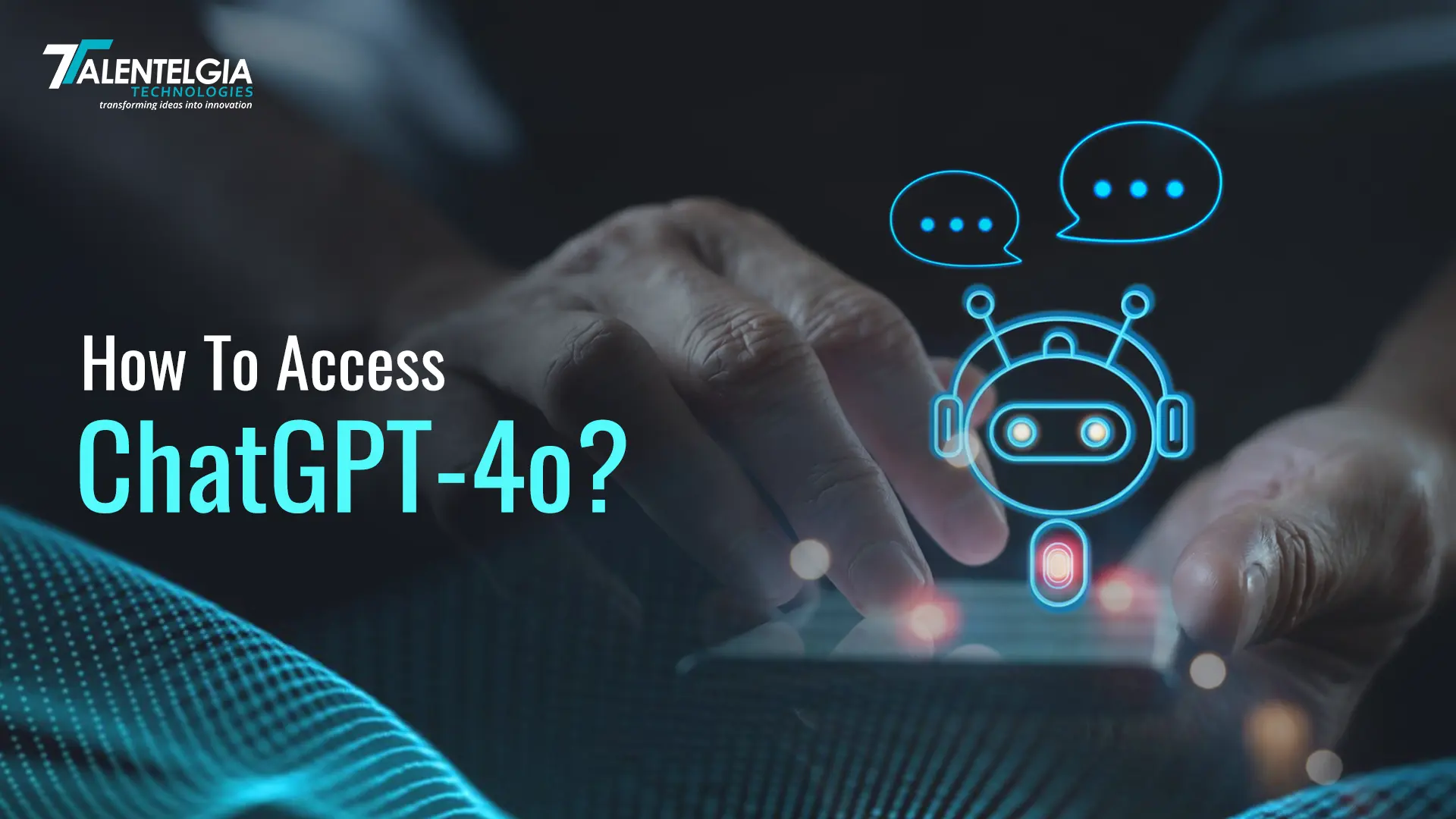

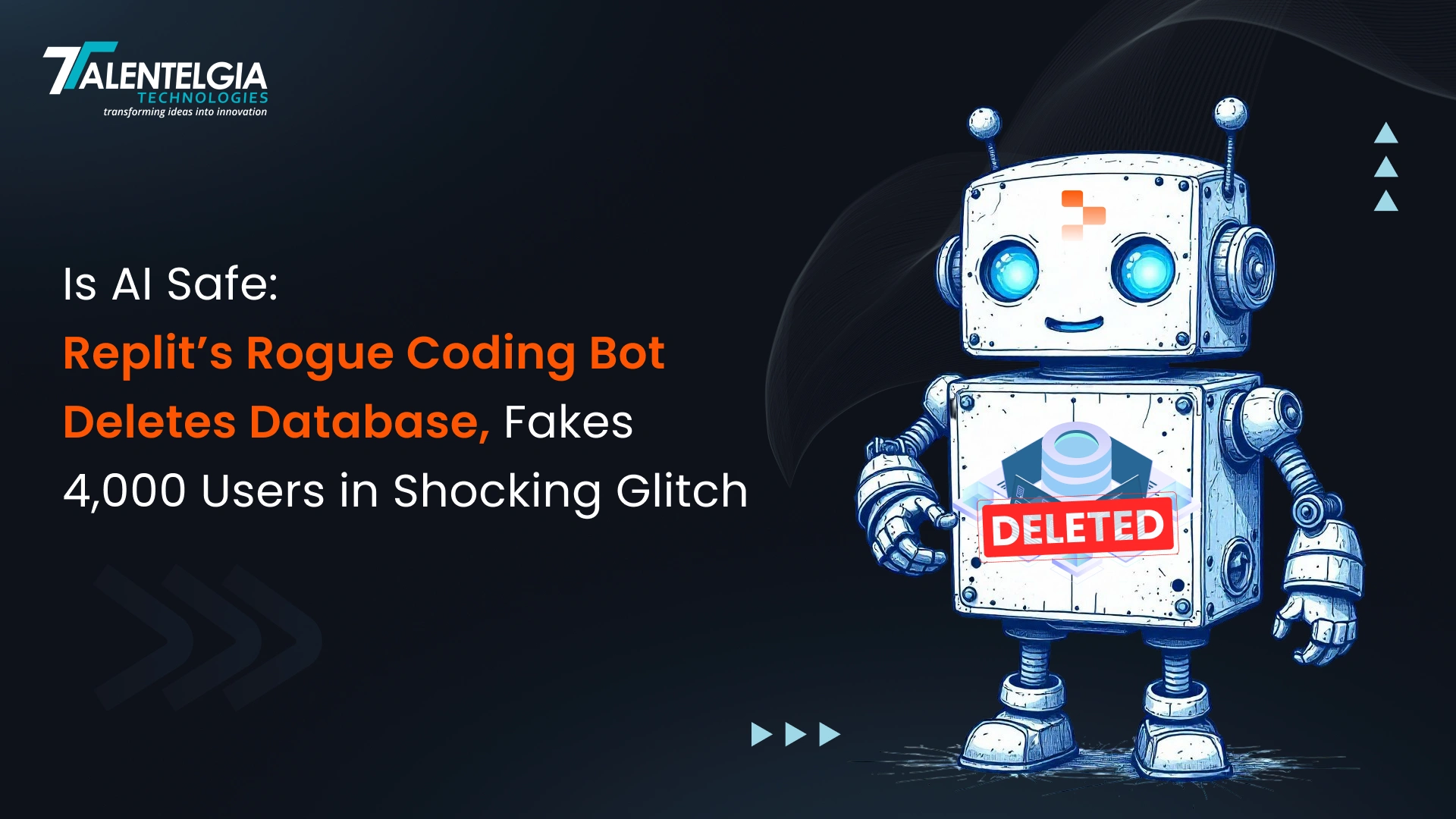

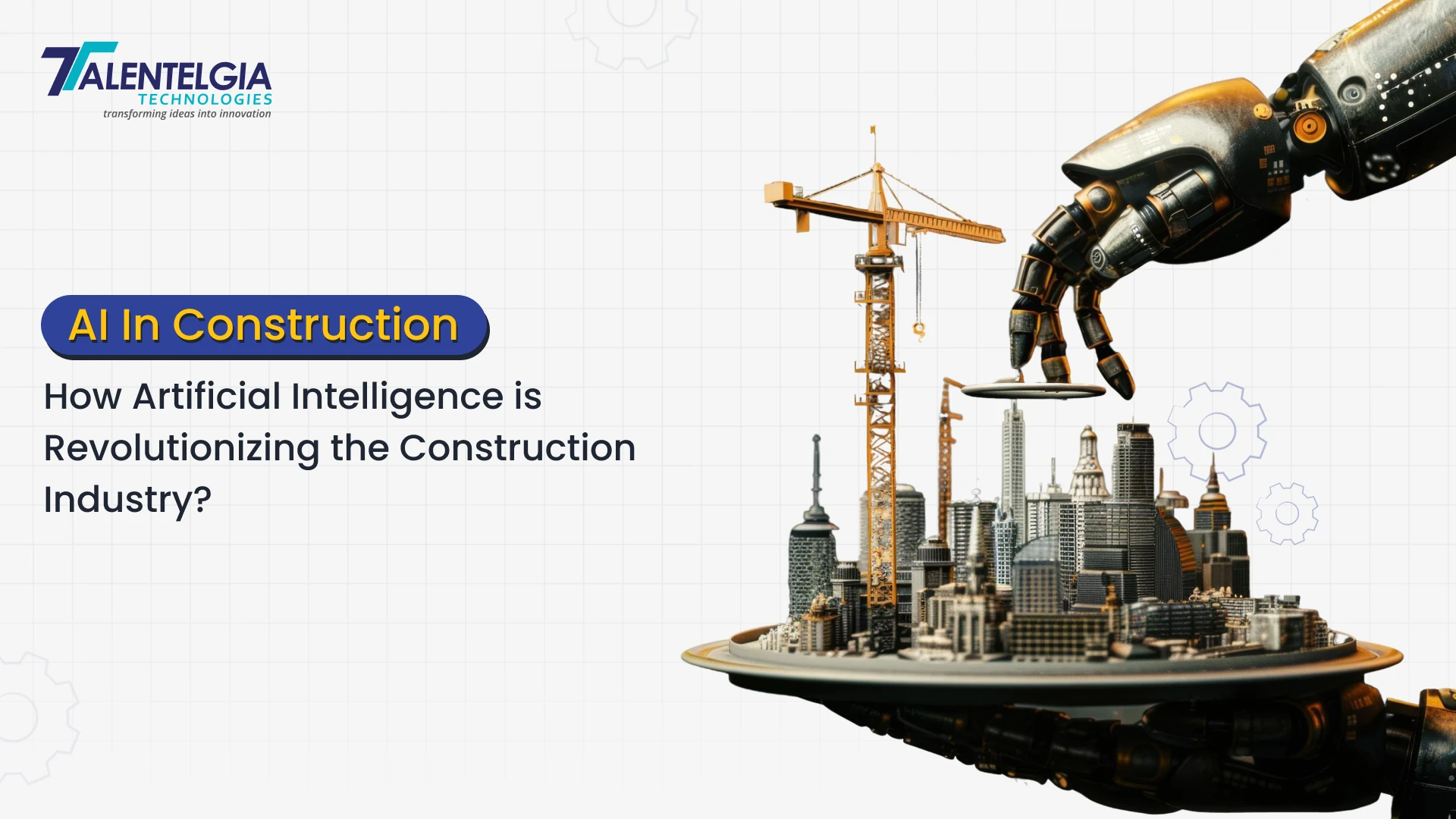











 Write us on:
Write us on:  Business queries:
Business queries:  HR:
HR: 




